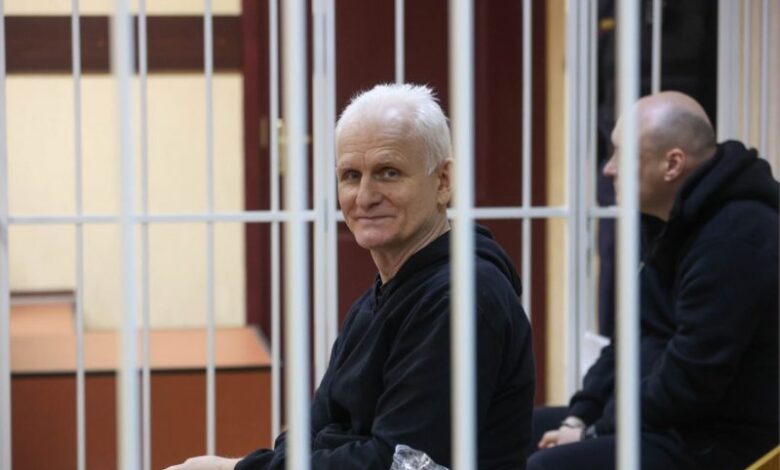Nobel laureate Ales Bialiatski gives final speech in court

The trial in the criminal case against Nobel laureate and chairperson of the Viasna Human Rights Center Ales Bialiatski, his deputy and International Federation for Human Rights (FIDH) vice-president Valiantsin Stefanovich, coordinator of the Human Rights Defenders for Free Elections campaign Uladzimir Labkovich, and human rights defender Dzmitry Salauyou (in absentia) has ended. The prosecutor demanded 9 to 12 years of imprisonment for the human rights defenders. The sentence will be announced on March 3.
We publish an abridged version of the final speech Ales Bialiatski delivered in court on February 13:
“The criminal case against us – the human rights defenders of Viasna – is politically motivated. The whole epic of 284 volumes, hundreds of searches and interrogations all over the country have nothing in common with the preliminary investigation, plus the political subtext. And after that, there was no fair trial either.
The so-called criminal investigation lasted a year and a half. Vital Brahinets, one of the four lawyers who defended me at various stages [of the investigation and trial], ended up imprisoned for eight years; two others were disbarred in recent months, and only one made it to the finish line. This unprecedented pressure on lawyers highlights difficult and dangerous conditions under which they must defend their clients.
The situation with the [Belarusian] language in court is alarming: the prosecution and the court categorically refused to speak Belarusian, even though I, as a defendant, am a Belarusian-speaking person. I speak, write, and think in Belarusian. I remind you that the Belarusian language is an official language, and you, as state officials, are obligated to have mastery of both official languages, including Belarusian.
The prosecution and the court have virtually refused to interrogate me and didn’t ask questions they were interested in during the trial and interrogations. It seems that neither the Prosecutor’s Office nor the court is interested in the truth. Everything was clear to them from the very beginning, even before the trial. Let me remind you that neither the Prosecutor’s Office nor the court gave me an opportunity to familiarize myself with all the 284 volumes of materials in the so-called criminal case.
Only in the dark years of the Russian Empire and Stalin’s rule up until his death in 1953 did something like this happen in our history. At the beginning of the 1980s, at the height of the Soviet Union’s crackdown on dissidents, human rights activists, and activists of national and religious movements, there were about 3,000 political prisoners in the entire Soviet empire with its vast population of 250 million people. Now there are 1,500 political prisoners in Belarus alone.
The situation of a full-scale crisis in Belarus is perilous for the country’s sovereignty. […] All of us and first and foremost the authorities should show wisdom and foresight for the sake of the preservation of Belarus as a state and for the sake of our people’s future.
A broad public dialog aimed at national reconciliation should be initiated regardless of how daunting the task might seem to some. It must be preceded by the release of all political prisoners, a broad amnesty, and an end to repression since there is no point in an amnesty if they release people with one hand and keep putting them away with the other.
Enough is enough, we must stop this civil war!”
The website on Ales Bialiatski’s life journey is now available in English, French, German, and Polish thanks to the Voice of Belarus team.
Ales Bialiatski, the Viasna Human Rights Center chair, received the Nobel Peace Prize in 2022 while in custody. The human rights activist and his colleagues are charged with “smuggling by an organized group” in 2016–2020 and “funding group actions that grossly violate public order” during mass protests after the 2020 presidential elections.